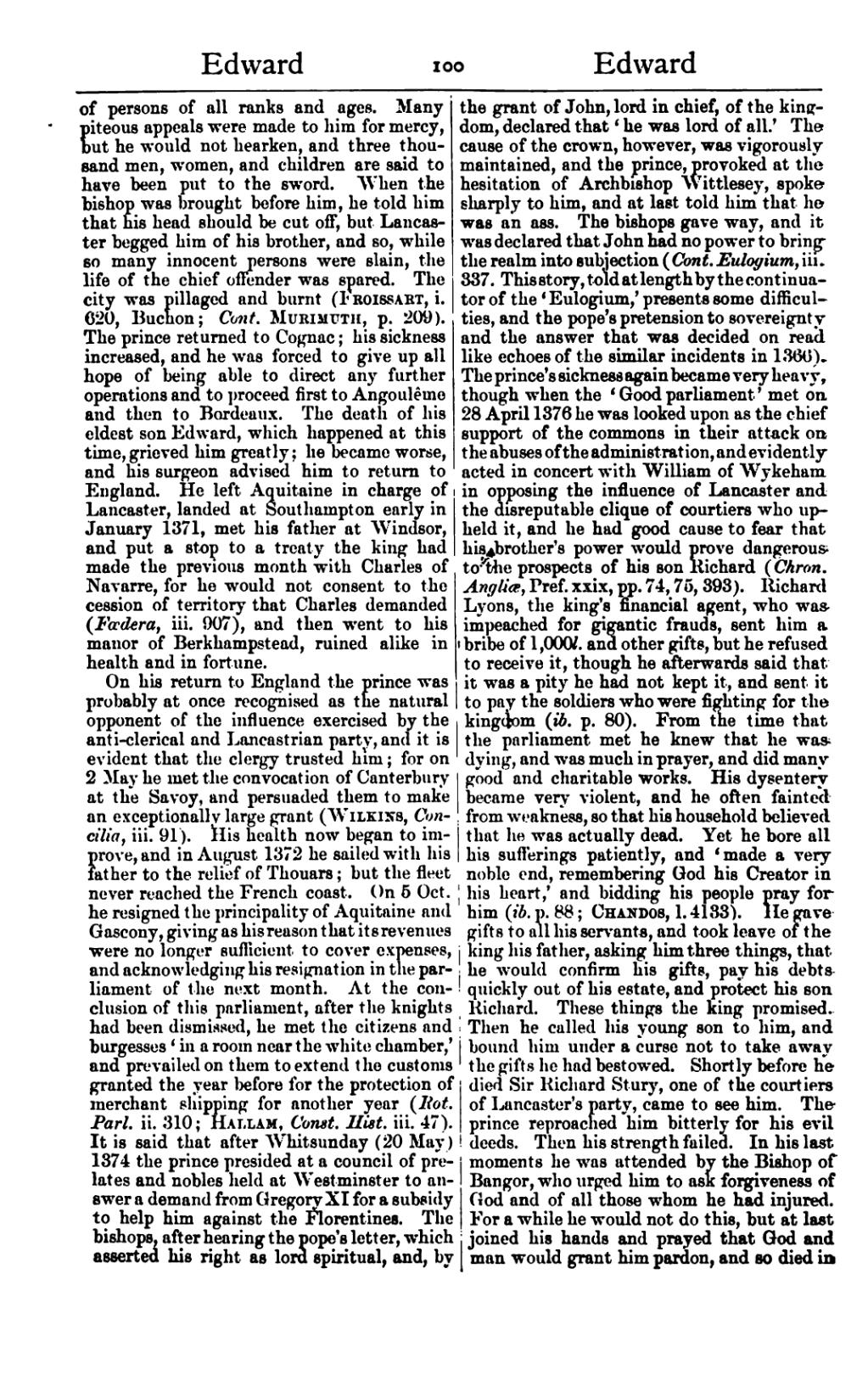of persons of all ranks and ages. Many piteous appeals were made to him for mercy, but he would not hearken, and three thousand men, women, and children are said to have been put to the sword. When the bishop was brought before him, he told him that his head should be cut off, but Lancaster begged him of his brother, and so, while so many innocent persons were slain, the life of the chief offender was spared. The city was pillaged and burnt (Froissart, i. 620, Buchon; Cont. Murimuth, p. 209). The prince returned to Cognac; his sickness increased, and he was forced to give up all hope of being able to direct any further operations and to proceed first to Angoulème and then to Bordeaux. The death of his eldest son Edward, which happened at this time, grieved him greatly; he became worse, and his surgeon advised him to return to England. He left Aquitaine in charge of Lancaster, landed at Southampton early in January 1371, met his father at Windsor, and put a stop to a treaty the king had made the previous month with Charles of Navarre, for he would not consent to the cession of territory that Charles demanded (Fœdera, iii. 967), and then went to his manor of Berkhampstead, ruined alike in health and in fortune.
On his return to England the prince was probably at once recognised as the natural opponent of the influence exercised by the anti-clerical and Lancastrian party, and it is evident that the clergy trusted him; for on 2 May he met the convocation of Canterbury at the Savoy, and persuaded them to make an exceptionally large grant (Wilkins, Concilia, iii. 91 ). His health now began to improve, and in August 1372 he sailed with his father to the relief of Thouars; but the fleet never reached the French coast. On 6 Oct. he resigned the principality of Aquitaine and Gascony, giving as his reason that its revenues were no longer sufficient to cover expenses, and acknowledging his resignation in the parliament of the next month. At the conclusion of this parliament, after the knights had been dismissed, he met the citizens and burgesses 'in a room near the white chamber,' and prevailed on them to extend the customs granted the year before for the protection of merchant shipping for another year (Rot. Parl. ii. 310; Hallam, Const Hist, iii. 47). It is said that after Whitsunday (20 May) 1374 the prince presided at a council of prelates and nobles held at Westminster to answer a demand from Gregory XI for a subsidy to help him against the Florentines. The bishops, after hearing the pope's letter, which asserted his right as lord spiritual, and, by the grant of John, lord in chief, of the kingdom, declared that 'he was lord of all.' The cause of the crown, however, was vigorously maintained, and the prince, provoked at the hesitation of Archbishop Wittlesey, spoke sharply to him, and at last told him that he was an ass. The bishops gave way, and it was declared that John had no power to bring the realm into subjection (Cont. Eulogiim, iii. 337. This story, told at length by the continuator of the 'Eulogium,' presents some difficulties, and the pope's pretension to sovereignty and the answer that was decided on read like echoes of the similar incidents in 1366). The prince's sickness again became very heavy, though when the 'Good parliament' met on 28 April 1376 he was looked upon as the chief support of the commons in their attack on the abuses of the administration, and evidently acted in concert with William of Wykeham in opposing the influence of Lancaster and the disreputable clique of courtiers who upheld it, and he had good cause to fear that his brother's power would prove dangerous to the prospects of his son Richard (Chron. Angliæ, Pref. xxix, pp. 74, 75, 393). Richard Lyons, the king's financial agent, who was impeached for gigantic frauds, sent him a bribe of 1,000l. and other gifts, but he refused to receive it, though he afterwards said that it was a pity he had not kept it, and sent it to pay the soldiers who were fighting for the kingdom (ib, p. 80). From the time that the parliament met he knew that he was dying, and was much in prayer, and did many good and charitable works. His dysentery became very violent, and he often fainted from weakness, so that his household believed that he was actually dead. Yet he bore all his sufferings patiently, and 'made a very noble end, remembering God his Creator in his heart,' and bidding his people pray for him (ib. p. 88;Chandos, 1. 4133). He gave gifts to all his servants, and took leave of the king his father, asking him three things, that he would confirm his gifts, pay his debts quickly out of his estate, and protect his son Richard. These things the king promised. Then he called his young son to him, and bound him under a curse not to take away the gifts he had bestowed. Shortly before he died Sir Richard Stury, one of the courtiers of Lancaster's party, came to see him. The prince reproached him bitterly for his evil deeds. Then his strength failed. In his last moments he was attended by the Bishop of Bangor, who urged him to ask forgiveness of God and of all those whom he had injured. For a while he would not do this, but at last joined his hands and prayed that God and man would grant him pardon, and so died in
